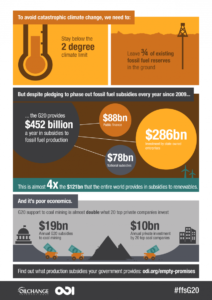What forms of energy are we prioritising?
Renewable Energy 30th November 2015
On the 19th October it was reported, in not so many words, that Britain has a renewable energy problem. Chief environmental scientist to the UN Professor Jacquie McGlade explicitly criticised the UK government for cutting subsidies for the development of renewable energy sources whilst simultaneously giving tax breaks to large oil and gas companies. Amongst other casualties of this policy are the three solar firms that have been forced to close due to cuts, resulting in a thousand job losses. Whilst the government has said that it wants to build renewables without subsidies, the truth of the matter is that without state financial back up, the opportunity to build more renewables has been drastically curtailed. What we can see is that renewable energy and fossil fuel energy are being financially pitted against one another and that, ultimately, fossil fuel companies are being given preferential treatment.

In the case of the UK’s energy programme, development is too widely connected with free markets and a lack of state input. This government, by pandering to large fossil fuel organizations with tax cuts and letting energy prices go unregulated (a policy first pioneered by Margaret Thatcher in 1986) have demonstrated that unchecked production of energy using fossil fuels- for both financial and quasi-political gain- is more of a priority. Embarrassingly, the UK is the only country in the G7 to continue offering subsidies to fossil fuel companies. But this is a trend that can be seen across other of the world’s most powerful countries: the G20 have, in total, give $452 billion dollars worth of subsidies to fossil fuel providers every year, expanding the profits of the people at the top of those companies and heaping damage onto the environment. There seems to be a clear-cut correlation between power, wealth and the perpetuation of fossil fuel production. Green energy, with its emphasis on providing for the needs of people and the planet and without looking to garner enormous profits does not come from the same school of political and ideological discourse. As long as governments unashamedly seek to protect the wealth of powerful corporations and individuals, it is highly likely that the renewable sector is going to continue to suffer.
Elizabeth Harper is a writer and critic, currently working in fashion.



I feel it’s less to do with money being generated and more to do with the amount of money needed to be ploughed into the green energy to make it anywhere near sustainable for the whole country to run on it. The nuclear energy comment worries me (I’m a scientist for a living), and clearly your facts on nuclear and the dangers when it goes wrong have not crossed your mind. Anything to make the Tories look worse off is good enough facts for you.
The one thing I don’t get is if we are receiving funding for it – what are we doing with it? Would appreciate a link to it (to allow me to read up more too).
I think in an idealistic world we would all live to be using green power, but unfortunately economically it doesn’t currently work for us.
I have hyperlinked all of my facts and figures to various sources, which you should be able to access by clicking on them.
We all know that fossil fuels are damaging to the environment but because they produce so much profit, they are seen as much more economically worthwhile than green energy sources, because we live in a society presided over by free market economics. The point is, our government is taking steps backwards in terms of their green energy funding and I think this is absolutely because renewable energy doesn’t lend itself as well to huge profits: it’s much more of a people project. The government is not doing enough for renewables by cutting subsidies, pandering to fossil fuel companies and the people who own them. This is an observation I am making, I am not just advocating for green energy as you suggest.
I think there has to be a concerted effort to move to low-carbon forms of energy, which includes nuclear and renewables, especially solar and tidal. If we could use people’s skills in fossil fuel industries to work in nuclear or on green developments, that would remove the problem of leaving people unemployed. I find it incredibly ironic that such a neoliberal country like Britain is receiving funding for nuclear power stations from countries like China, where energy is controlled and regulated by the state. Nuclear is similar to green energy because it involves long-term investment that isn’t all about profit, which is why in arguably ‘left wing/socialist’ countries like France and China, they have nuclear programmes.
Could you show us all where you get your factual information from?
You also haven’t taken into account that the number of solar / wind / various other renewable energies we need to even consider turning off / shutting down power station is massively exponential in costs… And even then we would still need most of the power stations due to the fact that our power station systems aren’t viable at half power… They either have to be on or off completely. What would you say about the people who would lose their jobs at those companies?! Or are they not considered worthy enough for you up on your high and mighty green only horse?